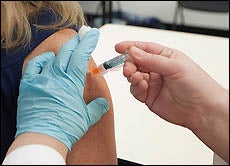Rumors and Legends: ECU researcher examines fears, controversy surrounding vaccinations
In movie theaters, the new film “Contagion” documents a fast-moving viral epidemic. Debate continues about HPV vaccine. Signs tout seasonal flu shots in local pharmacies.
East Carolina University English professor Andrea Kitta could not have picked a more fitting climate for release of her new book, “Vaccinations and Public Concern in History: Legend, Rumor, and Risk Perception.”
The bottom line drawn from Kitta’s research is the same as the answer she often gives to parents who seek advice on vaccinating children. “You will have to make that decision for yourself,” she says.
But understanding what drives the vaccine controversy can help.
Kitta’s research on how personal narrative, rumor and urban legends sway vaccination choices can inform the decision-making process, while at the same time offering insight to help medical professionals provide more effective, more sensitive communication on vaccination.
Narratives, fear fuel beliefs
“Everyone has a good reason for believing what they believe,” Kitta said.

Dr. Andrea Kitta
(Contributed photo)
But personal narrative plays a major role in those beliefs. Her book is unique in that it examines narratives representing all sides of the vaccination issue – from both pro- and anti-vaccination groups, public health officials and members of the medical community.
Kitta explained that vaccinations sometime do have negative effects, and people should report adverse reactions. But personal stories of adverse reactions will lead people to make assumptions about a vaccine’s safety, even when science indicates the percentages for side effects are small.
“If a doctor gives a vaccine to 100 people and only one has an adverse reaction, that’s a good percentage for the doctor…but not for the one person who got sick,” Kitta said. That one person’s personal narrative will affect other people’s decisions to accept or reject the vaccine.
When tragedy strikes, people want something or someone to blame, she said. “If none exists, we will find it. It makes people feel better,” she said. This need drives the rumors and urban legends that rise regarding vaccinations.
Medical rumors and legends play into natural human fears, Kitta said. Anxiety about vaccinations stems in part from fear of needles, which cross a natural human boundary – the skin. Humans are overly conscious of anything that goes into the body, she said.
Kitta said that research shows that people are much more likely to accept an inhaled vaccine than one delivered through a needle.
“It takes away that fear,” she said.
Kitta’s research uncovered many reasons why people choose not to get vaccinations, including fear, cost, accessibility and concern about side effects. But she did find some surprises, including a large number of medical professionals who refused the flu vaccine. Their reasons were not cost or fear or accessibility, Kitta said. Instead the medical professionals assumed they had already developed immunity through exposure to sick patients.
Kitta concluded that effective counseling regarding vaccination decisions should be based on the “reality of what people believe, not what we think they believe.”
“We need to examine what people are really afraid of and negotiate solutions that take away that fear,” she said.
Urban legends communicate messages
Arguments against vaccines are practically the same today as the claims made when vaccines were first introduced. People have always questioned whether vaccines are dangerous, unnatural or risky.
But thanks to technology, these arguments now spread more rapidly and reach a larger audience. Rumors and urban legends provide an effective medium for communicating the message.

Vials of flu vaccine are ready for distribution at the Sept. 20 flu shot vaccine clinic in ECU’s Student Health Center. Fear of needles is one of the reasons healthy individuals avoid immunizations. (Photo by Cliff Hollis)
Kitta said urban legends can be identified through several classic characteristics: everything is explained, there are no loose ends; the story is supposedly repeated from a friend of a friend or someone who can be trusted; the stories are often localized geographically.
Most college campuses share the same legends, she said. “There’s always a haunting, and nearly every college campus has a story that the library is sinking because the architect did not account for the weight of all the books.” Even medical professionals have legends, she said. One story Kitta discovered in Canada tells of a Toronto physician who had children removed from their parents because the parents would not vaccinate. That never happened, Kitta said.
The important thing about urban legends is not so much its truth or fiction, but the message people are trying to deliver with the story, she said. The Toronto doctor story most likely reflected frustration from medical professionals whose patients did not trust their advice to vaccinate. The library story might reflect frustrated students expressing the concept that some smart people are not as smart as they think they are.
Whether based in truth or fiction, each urban legend serves to deliver a powerful message.
Personal experience trumps science
People tend to believe personal narrative rather than scientific fact, Kitta said. Multiple medical studies have proven that the flu shot does not cause mild flu symptoms. Yet nearly everyone expects to feel bad for a few days after receiving the shot, she said.
“It’s personal experience and sharing stories that we rely on, not the science,” Kitta said.
Parents choosing whether to give their children the MMR vaccine for Measles, Mumps and Rubella must consider personal narratives that link the vaccine to Autism. Most of those parents have never seen children suffering from Measles, Mumps or Rubella, but they see or hear stories about autistic children all the time.
Personal experience has more impact, Kitta said. Therefore medical professionals who wish to improve the rate of MMR vaccine compliance should use personal narrative in addition to quoted science. Sharing information about children who contracted the MMR diseases, or telling parents, “My children are vaccinated,” will be much more effective, Kitta said.
Contagion potential is real
The newly released movie, “Contagion,” tracks the spread of a contagious virus and efforts to create an effective vaccine. The movie stands as a fairly accurate cautionary tale about how easily disease can spread, Kitta said.
“We are overdue,” she said. “There is usually a big outbreak of contagious disease every 50 years, but we have not seen a large scale epidemic since 1918.
“It will eventually happen.” Even an epidemic that affects only 1 percent of the world’s population would kill millions of people, she said.
Immunization protects the ‘herd’
Vaccines do come with risks, Kitta said, but healthy individuals who choose vaccination are contributing to the common good by participating in what she termed “herd immunity.”

Healthy individuals who choose to take vaccinations are helping prevent spread of diseases among those who are unable to tolerate the vaccine. (Photo by Cliff Hollis)
For a vaccine to be effective, approximately 94 to 96 percent of the population must be either vaccinated or immune, so they do not spread the disease to the small percentage of people who cannot tolerate the vaccine. “It’s like a herd that keeps its weakest members protected in the center,” she said.
Establishing herd immunity drives the campaign for healthy individuals to get vaccinations. It’s not about pharmaceutical companies making money as some believe, Kitta said. Healthy individuals who can take the vaccine but choose not to are receiving all the benefits of herd immunity without undertaking any risk. Individuals who are vaccinated help protect the herd.
But mandatory vaccination is not the answer, Kitta said. Instead medical professionals should ascertain the fears and beliefs that drive each patient’s decision not to vaccinate and negotiate directly with that patient, using personal narrative to get the message across.
Kitta joined ECU in 2009. She holds a Ph.D. in folklore from Memorial University of Newfoundland, an M.A. in folk studies from Western Kentucky University and a B.A. in history from Slippery Rock University of Pennsylvania.
###